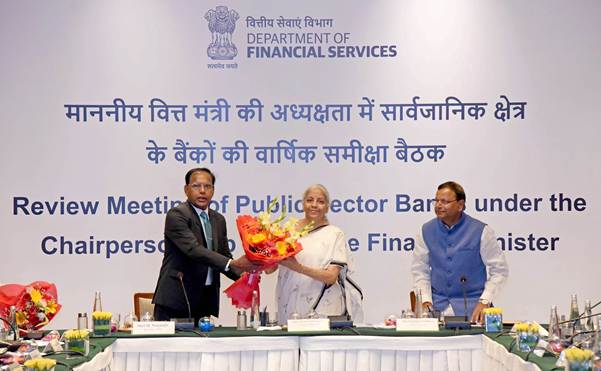Sitharaman Reviews PSBs’ Performance, Charts Strategy for Growth and Inclusion
Finance Minister Sitharaman applauded the sustained financial turnaround of PSBs in recent years, especially during FY 2024–25.

- Country:
- India
Union Minister for Finance and Corporate Affairs, Smt. Nirmala Sitharaman, led a comprehensive high-level review meeting with the heads of Public Sector Banks (PSBs) on Thursday in New Delhi, outlining an ambitious, forward-looking roadmap to strengthen India’s banking system. The review covered critical areas including financial performance, credit growth, financial inclusion, customer service, digital banking, cybersecurity, and human resource development.
The meeting was attended by Minister of State for Finance Shri Pankaj Chaudhary, Secretary of the Department of Financial Services Shri M. Nagaraju, Managing Directors of PSBs, and other senior officials from the Department of Financial Services (DFS).
Strong Financial Performance Despite Challenges
Finance Minister Sitharaman applauded the sustained financial turnaround of PSBs in recent years, especially during FY 2024–25. Between FY 2022–23 and FY 2024–25, PSBs collectively saw:
-
Total business rise from ₹203 lakh crore to ₹251 lakh crore
-
Net Non-Performing Assets (NPAs) drop sharply from 1.24% to 0.52%
-
Net profits increase from ₹1.04 lakh crore to ₹1.78 lakh crore
-
Dividend payouts climb from ₹20,964 crore to ₹34,990 crore
-
Capital Adequacy Ratio (CRAR) at a healthy 16.15% as of March 2025
These figures reflect enhanced efficiency, disciplined credit management, and the success of governance reforms in the public banking sector.
Strategic Focus: Building the Banks of the Future
Emphasizing sustainable and inclusive growth, Smt. Sitharaman directed PSBs to proactively identify emerging commercial growth areas for the next decade, including sunrise sectors, innovation-driven industries, and green energy.
PSBs were urged to deepen corporate lending in productive sectors while adhering to strong underwriting and risk management practices. In line with Budget 2025–26 priorities, she particularly highlighted financing for indigenously designed Small Modular Nuclear Reactors (SMRs), encouraging banks to develop tailored credit models to support the sector.
Expanding Financial Inclusion and Rural Penetration
Reaffirming the government’s commitment to “Banking for All”, FM instructed PSBs to intensify their efforts under major financial inclusion schemes, including:
-
PM MUDRA Yojana
-
PM Vishwakarma Yojana
-
PM Surya Ghar Muft Bijli Yojana
-
PM Vidyalakshmi Scheme
-
Kisan Credit Card (KCC)
-
PM Jan Dhan Yojana
-
PM Jeevan Jyoti Bima Yojana
-
PM Suraksha Bima Yojana
Particularly, the PM Dhan Dhanya Yojana was identified as a strategic thrust area, with 100 low crop productivity districts to be targeted for specialized agri-credit solutions aimed at boosting productivity and local economic potential.
Sitharaman also launched the groundwork for a Financial Inclusion Saturation Campaign starting July 1, 2025, covering 2.7 lakh Gram Panchayats and Urban Local Bodies, with a focus on KYC updates, re-KYC, and recovery of unclaimed deposits.
MSME, Education and Entrepreneurship Credit Support
The Finance Minister reviewed progress under the New Credit Assessment Model for MSMEs, launched on March 6, 2025, under which 1.97 lakh MSME loans worth ₹60,000 crore have already been sanctioned. Banks were instructed to broaden its implementation to ease capital access for India’s micro and small enterprises.
Under Stand Up India, 2.28 lakh loans worth ₹51,192 crore have been sanctioned to support women and marginalized entrepreneurs. Similarly, the PM Vidyalakshmi Scheme has cleared 6,682 educational loan applications, disbursing ₹1,751 crore—a step in the direction of democratizing access to higher education.
The Finance Minister directed PSBs to enhance focus on these targeted schemes and improve outreach in underserved communities.
Boosting Global and Digital Banking Aspirations
FM called for increased PSB participation in GIFT City to align with India’s aspirations in international financial services, and to explore opportunities in the India International Bullion Exchange (IIBX).
In digital banking, Sitharaman stressed the need for simplified, multilingual platforms, along with clean, user-friendly physical branches—especially in urban and metro centres—to keep pace with rising urbanization and digital transformation.
She also placed emphasis on cybersecurity, urging PSBs to proactively adopt robust systems to protect customer data and maintain trust in the digital banking ecosystem.
Strengthening Human Resources and Last-Mile Access
Smt. Sitharaman underscored the importance of staffing and HR management in delivering quality banking services. She directed banks to fill all existing and upcoming vacancies without delay, especially in critical service delivery areas.
To deepen rural reach, banks were encouraged to scale up branch expansion in underserved areas, particularly the North-East, and reinforce their Business Correspondent (BC) network to guarantee last-mile access.
A Roadmap for Equitable Growth
In concluding the session, Finance Minister Sitharaman commended the achievements of PSBs but reminded them of their responsibility to balance commercial viability with the nation’s socio-economic objectives.
“As custodians of public capital, PSBs must lead the charge in financing India’s future—from green energy to rural transformation, from MSME innovation to global finance leadership,” she said.
With clear directives and a comprehensive strategic vision, PSBs are now poised to play a pivotal role in shaping a resilient, inclusive, and globally competitive Indian economy.










